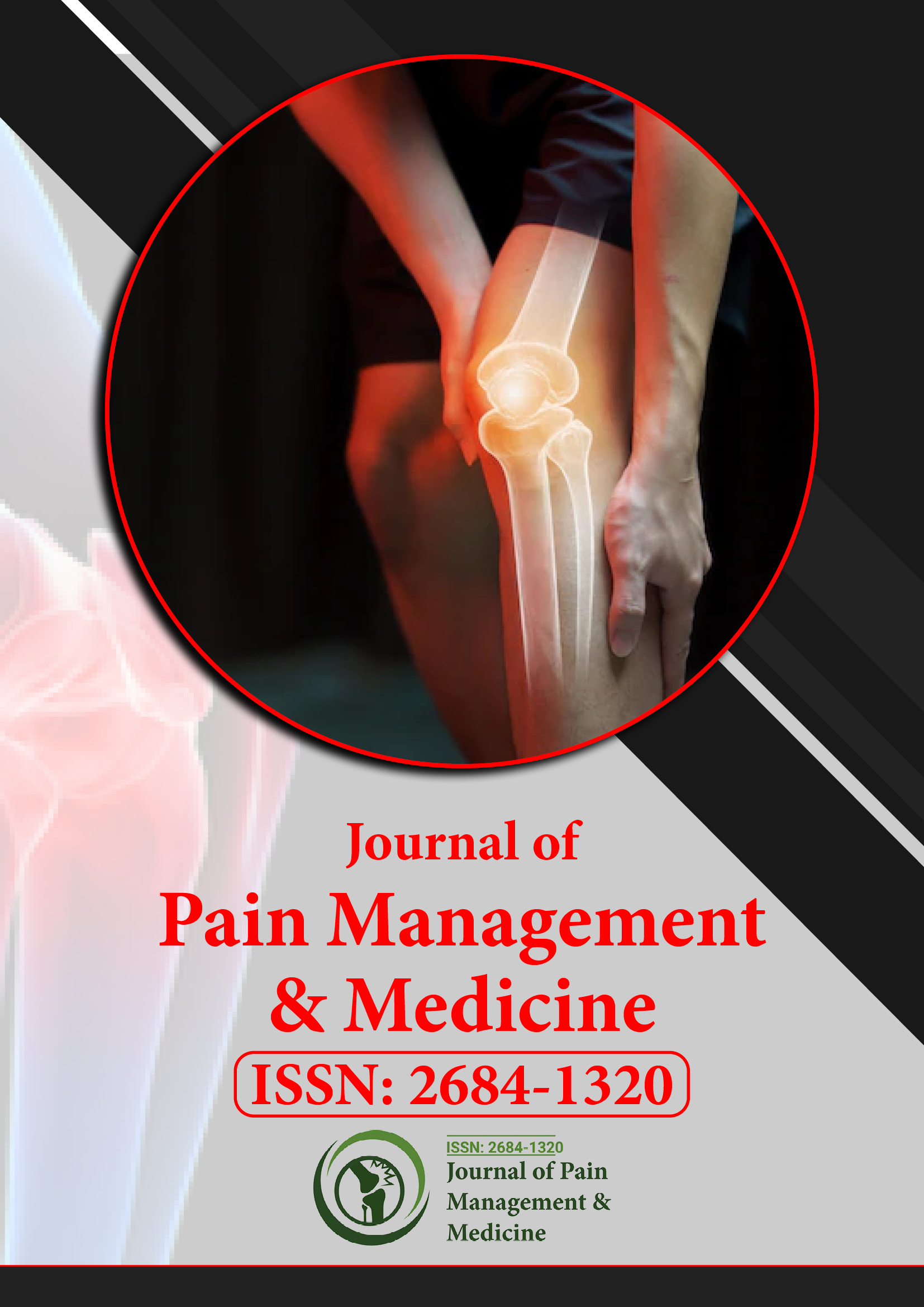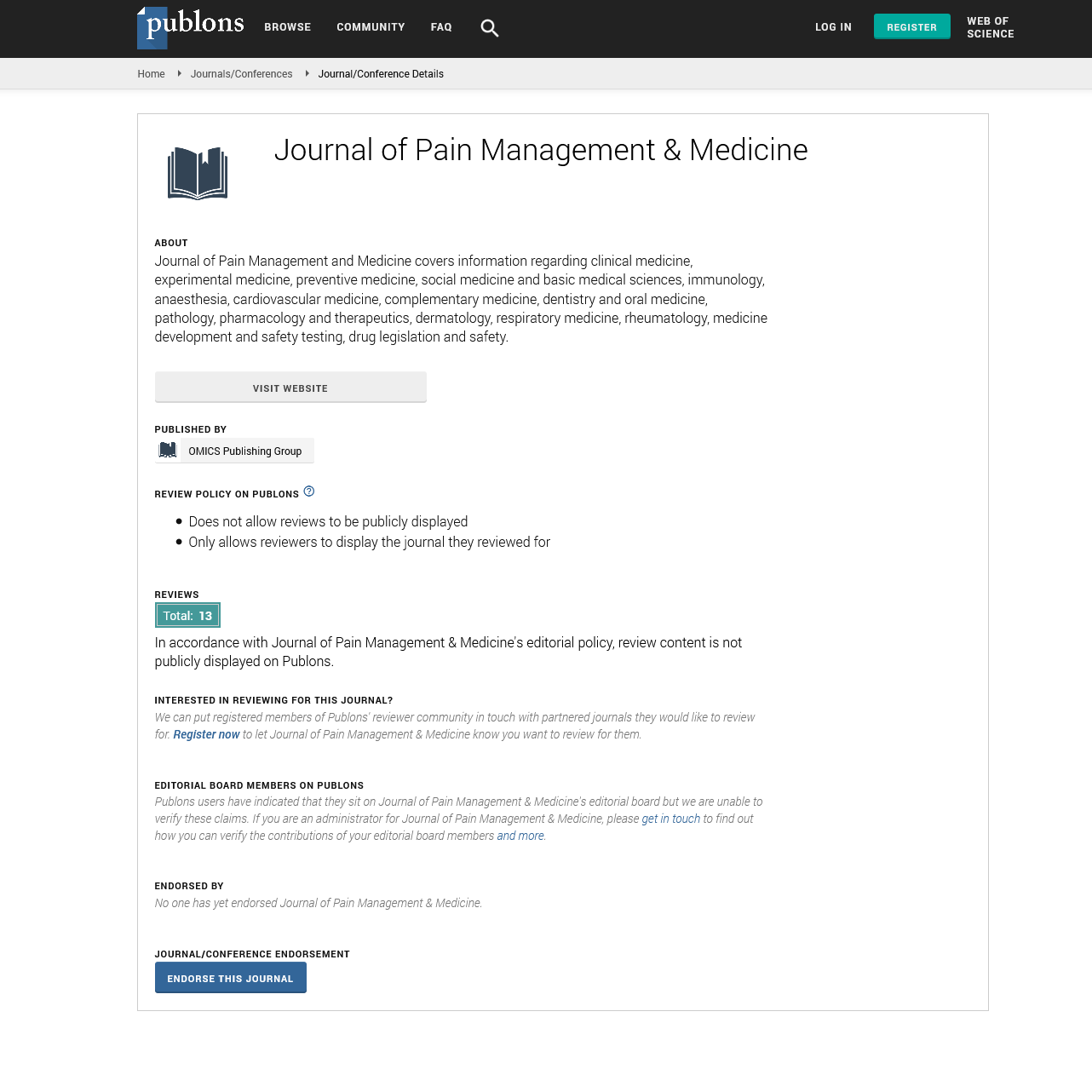Indexed In
- RefSeek
- Hamdard University
- EBSCO A-Z
- Publons
- Euro Pub
- Google Scholar
- Quality Open Access Market
Useful Links
Share This Page
Journal Flyer

Open Access Journals
- Agri and Aquaculture
- Biochemistry
- Bioinformatics & Systems Biology
- Business & Management
- Chemistry
- Clinical Sciences
- Engineering
- Food & Nutrition
- General Science
- Genetics & Molecular Biology
- Immunology & Microbiology
- Medical Sciences
- Neuroscience & Psychology
- Nursing & Health Care
- Pharmaceutical Sciences
Commentary - (2025) Volume 11, Issue 1
Influence of Psychological Resilience on Pain Perception and Functional Disability in Individuals with Osteoarthritis
Ethan T. Chen*Received: 01-Mar-2025, Manuscript No. JPMME-25-28845; Editor assigned: 03-Mar-2025, Pre QC No. JPMME-25-28845 (PQ); Reviewed: 17-Mar-2025, QC No. JPMME-25-28845; Revised: 24-Mar-2025, Manuscript No. JPMME-25-28845 (R); Published: 31-Mar-2025, DOI: 10.35248/2684-1320.25.11.311
Description
The pervasive impact of Osteoarthritis (OA) extends beyond the physical degradation of joints, significantly affecting individuals' pain experience and their ability to engage in daily activities. The observation that patients with similar levels of radiographic OA can report vastly different levels of pain and functional limitations underscores the crucial role of psychological factors in shaping the OA experience. Psychological resilience, the capacity to adapt positively to adversity, including the chronic pain and functional challenges posed by OA, has emerged as a critical area of investigation. Understanding and potentially enhancing resilience offers a promising avenue for improving outcomes in this prevalent condition.
One of the key insights to be gained from exploring the influence of psychological resilience in OA is the potential to explain the heterogeneity of the disease experience. While structural changes in joints are undeniable, the degree to which these changes translate into pain and disability appears to be modulated by an individual's psychological resources. Resilience, encompassing traits like optimism, self-efficacy, and coping flexibility, may act as a buffer against the negative psychological consequences of OA, thereby influencing how pain is perceived and how individuals adapt their functional abilities. Future research should aim to disentangle the specific facets of resilience that are most protective in the context of OA.
Furthermore, investigating the relationship between resilience and key psychological mediators such as pain catastrophizing, fear-avoidance beliefs, and mood disorders is crucial. It is plausible that higher resilience mitigates the development or intensity of these maladaptive psychological states, which are known to amplify pain perception and hinder functional engagement. For instance, an individual with high self-efficacy (a component of resilience) might be less likely to catastrophize about their pain, leading to reduced fear of movement and better adherence to exercise recommendations. Understanding these mediating pathways can inform the development of targeted interventions that aim to bolster resilience and address co-occurring psychological distress.
The longitudinal perspective on resilience and OA progression is particularly important. OA is a chronic and often progressive condition. Understanding how an individual's level of resilience evolves over time and how these changes correlate with the trajectory of their pain and functional disability can provide valuable insights into the dynamic interplay between psychological factors and disease progression. Identifying factors that either erode or enhance resilience in the context of OA could inform the timing and content of supportive interventions.
Moreover, the focus on resilience shifts the narrative in OA management from solely addressing pathology to empowering individuals to actively cope and adapt. While disease-modifying osteoarthritis drugs remain a significant unmet need, interventions aimed at enhancing psychological resilience offer a readily available and potentially impactful approach to improving patients' lives. This includes the integration of psychological therapies like Cognitive Behavioral Therapy (CBT), Acceptance and Commitment Therapy (ACT), and mindfulness-based interventions, which have shown promise in fostering resilience and improving pain management in other chronic pain conditions. Tailoring these interventions to the specific challenges faced by individuals with OA warrants further investigation.
The potential for a personalized approach to OA management based on an individual's resilience profile is an exciting prospect. Assessing a patient's level of resilience early in their OA journey could help identify those who might benefit most from proactive psychological support or resilience-building interventions alongside traditional physical and pharmacological treatments. This stratified approach could optimize resource allocation and ensure that individuals with lower resilience receive the targeted support they need to navigate the challenges of living with OA.
However, several challenges and considerations remain. Measuring psychological resilience in a standardized and clinically meaningful way is crucial for both research and practice. Validated and reliable instruments that capture the relevant facets of resilience in the context of chronic pain are needed. Furthermore, research needs to explore the bidirectional relationship between resilience and OA outcomes. While higher resilience may lead to better pain management and function, effectively managing pain and maintaining function may, in turn, enhance an individual's sense of self-efficacy and overall resilience.
In conclusion, the investigation into the influence of psychological resilience on pain perception and functional disability in individuals with osteoarthritis offers a valuable and increasingly recognized perspective in the field. By understanding how resilience modulates the OA experience and by developing and implementing interventions that foster these adaptive psychological resources, we can move towards a more holistic and empowering approach to managing this prevalent and often debilitating condition, ultimately improving the quality of life for millions of individuals.
Citation: Chen ET (2025 Influence of Psychological Resilience on Pain Perception and Functional Disability in Individuals with Osteoarthritis. J Pain Manage Med. 11.311.
Copyright: © 2025 Chen ET. This is an open access article distributed under the terms of the Creative Commons Attribution License, which permits unrestricted use, distribution, and reproduction in any medium, provided the original author and source are credited

